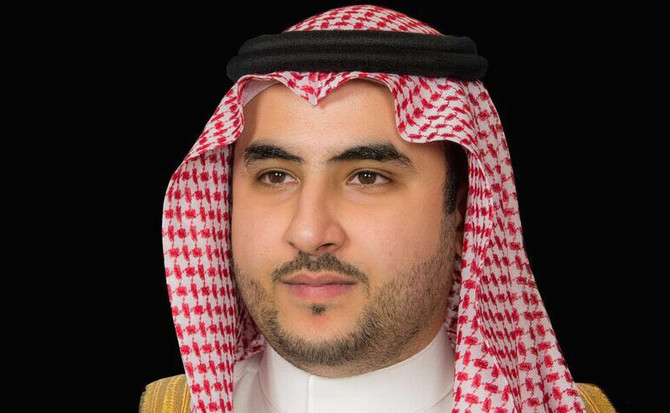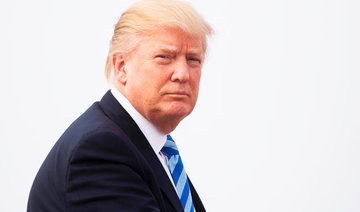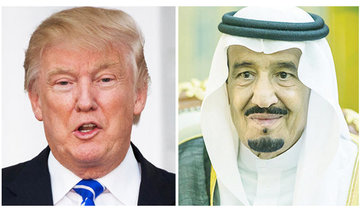WASHINGTON: The appointment of Prince Khaled bin Salman as the new ambassador to Washington is seen by analysts and Saudi-watchers as a boost to US-Saudi relations, establishing a high-level and personal channel with the administration of President Donald Trump.
The move, announced on Saturday as part of a series of decrees by the Kingdom, makes Prince Khaled — King Salman’s son and an air force pilot who flew an F-15 in the campaign against Daesh — the new envoy to Washington at a time of improved relations with the US and increased diplomatic traffic between the two capitals.
Saudi sources told Arab News that the incoming ambassador has recently spent more time in Washington, and is familiar with the lay of the land following Trump’s election last November.
Fahad Nazer, a political consultant based in Washington, said the appointment of Prince Khaled to such an important diplomatic post is consistent with a pattern that King Salman established shortly after ascending the throne in 2015.
“This, like other key appointments, sends an encouraging message to the youth of Saudi Arabia that if you distinguish yourself in your chosen field and demonstrate your abilities, your hard work will be rewarded,” Nazer told Arab News.
“In today’s Saudi Arabia, being young is considered an asset, not a liability. Prince Khaled has already served with distinction in the Royal Saudi Air Force. He received part of his education in the US, including in Washington. There’s no doubt that he’ll bring energy and focus — two qualities for which he’s known — to this most important of diplomatic posts.”
Joseph Bahout, a visiting scholar at the Carnegie Endowment for International Peace, told Arab News that the appointment is notable because “this is the first time a Saudi king appoints his son as ambassador,” signaling a “desire by King Salman to have a direct, permanent and personalized link with the US government and probably the inner Trump circle.”
In that sense, Bahout said Prince Khaled represents an “intimate” channel between Riyadh and Washington.
Publicly, bringing a younger face and an air force pilot to the forefront of Saudi representation in Washington projects an “image of renewal and strong engagement aimed at gradually transforming the public image of the Kingdom in the US, something the Saudis have so far failed at,” said Bahout.
In the Trump era, “the age and familial links of the new envoy should also be a gate for him to access more directly the Trump inner circle, that of his family, sons, daughter, and more importantly the influential son-in-law (Jared Kushner).”
The decision is a “master play by the king on the domestic and diplomatic levels. It’s also a bold move, given it’s uncharacteristic and breaks with traditional image.”
Prince Khaled bin Salman as US ambassador establishes ‘personal, direct’ link to Trump
Prince Khaled bin Salman as US ambassador establishes ‘personal, direct’ link to Trump

Syrian government foils Daesh plot to attack churches and New Year celebrations

- Bomber kills soldier in Aleppo, detonates explosives injuring 2 others
ALEPPO, DAMASCUS: The Syrian Interior Ministry announced on Thursday that it had thwarted a Daesh plot to carry out suicide attacks targeting New Year celebrations and churches, particularly in Aleppo.
The ministry said in a statement that, as part of ongoing counterterrorism efforts and careful monitoring of Daesh cells in cooperation with partner agencies, it had received intelligence indicating plans for suicide attacks targeting New Year celebrations in several provinces, particularly Aleppo, with a focus on churches and civilian gathering areas.
The ministry added that it took preemptive measures, including reinforcing security around churches, deploying mobile and fixed patrols, and setting up checkpoints across the city.
During operations at a checkpoint in Aleppo’s Bab Al-Faraj district, security forces intercepted a suspected Daesh member who opened fire. One internal security soldier was killed, and the attacker detonated explosives, injuring two others.
Daesh recently increased its attacks in Syria, and was blamed for an attack last month in Palmyra that killed three Americans.
On Dec. 13, two US soldiers and an American civilian were killed in an attack Washington blamed on a lone Daesh gunman in Palmyra.
In retaliation, American forces struck scores of Daesh targets in Syria.
Syrian authorities have also carried out several operations against Daesh since then, saying on Dec. 25 they had killed a senior leader of the group.













